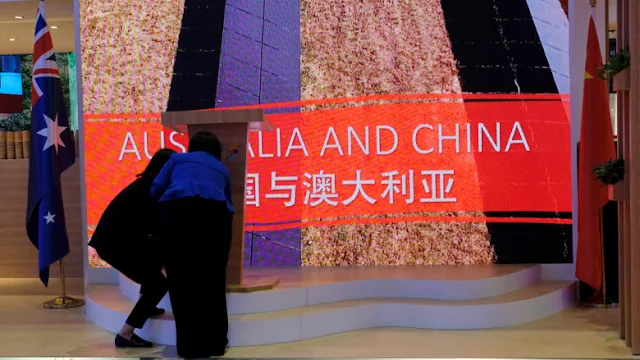Shanghai: Foreign Affairs Minister Marise Payne is due to arrive in Beijing on Thursday for a high-level meeting with her Chinese counterpart, the first on Chinese soil in over two years.
 |
| Bound for China - Marise Payne |
The visit is a significant step forward for the Morrison government in normalising relations with China, Australia's largest trading partner, after a year-long diplomatic dispute sparked by former prime minister Malcolm Turnbull's handling of foreign interference legislation.
Ms Payne's visit was confirmed by the Chinese foreign ministry in Beijing on Monday evening, Australian time.
Australia's annual foreign and strategic dialogue was last held in Beijing in February 2016 with then foreign minister Julie Bishop meeting with counterpart Wang Yi and the more senior State Councillor Yang Jiechi.
The most recent meeting was held between Ms Bishop and Mr Wang in Canberra in February 2017.
But amid a Beijing-imposed freeze on official visits by Australian ministers, Ms Bishop had been unable to secure a date for the 2018 meeting, which by convention was to be held in China.
Beijing had regarded a meeting between Ms Bishop and Mr Wang on the sidelines of the G20 in May in Argentina as unofficial, and released a public statement saying Mr Wang had told her Australia needed to “take off its coloured glasses” if it wanted to restore relations with China.
Ms Payne’s first meeting with Mr Wang in New York at the United Nations in September was received positively by both governments, with Beijing praising Australia’s complementary economy and support for free trade.
 |
| Xi Jinping at the opening ceremony for the China International Import Expo in Shanghai |
Ms Payne said in a statement the relationship with China was a priority of the highest order and she will travel to China on November 7-8 for the 5th Australia-China Foreign and Strategic Dialogue.
“I am looking forward to discussions with Minister Wang to enhance bilateral understanding and co-operation across the full range of Australia’s interests, spanning strategic, economic and people-to-people connections.
“The Australian government is committed to a constructive relationship with China, founded on shared interests and mutual respect.”
The economic partnership continues to strengthen, she said. The meeting was “an opportunity to discuss how we can strengthen co-operation and ensure we continue to advance regional security and prosperity in this period of rapid change”.
China’s thaw comes amid a worsening trade dispute between China and the United States, in which the Trump administration has sought to enlist its security allies to take sides.
Chinese television broadcasts of Chinese President Xi Jinping’s speech to an international trade fair on Monday repeatedly showed Trade Minister Simon Birmingham taking notes in the audience.
The television coverage leading up to Xi’s speech included an interview with Mr Birmingham where he said Australia celebrated China’s economic success.
Mr Birmingham’s attendance at the China International Import Expo, where he met with Chinese commerce minister Zhong Shan, marked the first official visit by an Australian minister to China in 2018.
Mr Morrison, who in the days before Mr Turnbull was toppled, approved new rules that exclude Chinese companies Huawei and ZTE from participating in Australia’s 5G network, has made several gestures to placate Beijing since becoming Prime Minister.
 |
| Staff at the Australia National Pavillion getting ready for vistors at the China International Import Expo |
Treasurer Josh Frydenberg is also still weighing the approval of a $13 billion bid by Hong Kong-based CK Group for APA, the owner of Australia's east coast gas pipelines, which critics want blocked on national security grounds.
Mr Morrison told prominent Chinese business magazine Caixin that Australia wanted “independent relationships” with the US and China, and came from a position of friendship with both countries.
In his speech, President Xi delivered a riposte to US President Donald Trump, saying countries “should not just point fingers at others to gloss over their own problems”, and declaring China is here to stay.
While not naming Mr Trump, who has fired off numerous public Tweets about Xi amid a multi-billion dollar trade war, the Chinese President said countries need to improve their business environments by addressing their problems.
China’s International Import Expo, which opened on Monday, is being pitched by Beijing as a concrete action to increase foreign imports. Mr Xi portrayed China as a champion of openness and free trade.
But he gave no major new concessions to the United States, other than to say China would continue to reform and open access for foreign companies to its markets.
Mr Xi pledged a crackdown on intellection property violations by putting in place “a punitive compensation system to significantly raise the cost for offenders”.
Mr Birmingham said after the speech he was pleased with Mr Xi’s comments on improving intellectual property protection and enforcement in China.
“This has been a persistent irritation for foreign companies, including Australian companies over many years,” Mr Birmingham said.
Multilateralism was under threat amid profound shifts in the international landscape, Mr Xi said, and warned that countries that retreated to seclusion would find economic stagnation.
China would push to conclude new multilateral trading deals – including the Regional Comprehensive Economic Partnership of which Australia is a negotiating partner, an investment agreement with the EU, and a free trade area with Japan and South Korea.
“After going through 5000 years of trials and tribulations China is still here. Looking ahead, China will always be here to stay,” he said.











0 Comments:
Post a Comment